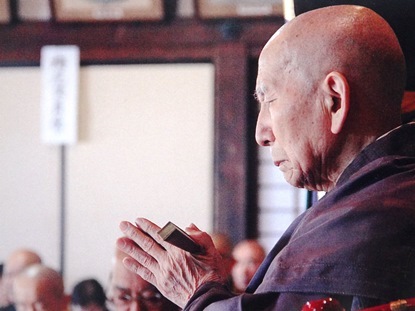ZEN MESTEREK ZEN MASTERS
« Zen főoldal
« vissza a Terebess Online nyitólapjára

楢崎一光 Narasaki Ikkō (1918-1996)
Dharma name: 大玄一光 Daigen Ikkō

Ikko Roshi's history:
* Eiheiji vice-abbot 大本山永平寺副貫首
* Zuiōji 瑞應寺僧堂 29° abbot
* Shōgoji 聖護寺 3° abbot
* Shōgakuji 拈華山正覺寺 (四国中央) 2° abbot
WHEN IKKŌ NARASAKI was a boy, he showed great talent as a calligrapher and won a national calligraphy contest judged by the Emperor. In 1945, Zuiōji buildings had fallen into disrepair; there were few monks and the practice had also been neglected, so Narasaki Rōshi raised funds and rebuilt the facilities. In 1951, then, he convinced to come a great teacher specialized in Zen Master Dōgen’s style of monastic living: Hashimoto Ekō Rōshi who reestablished the practice there, thus, over the next 40 years Zuiōji Sōdō became one of the foremost Sōtō Zen monastic centres in Japan attracting several superb teachers such as Tsūgen Narasaki Rōshi
大慈通元楢崎, Dainin Katagiri Rōshi 慈海大忍片桐 and Saitō Hōkan Rōshi 大道芳寛斎藤, who all became renowned Zen Masters. Daigen Ikkō Daioshō engaged in countless buddhist and social activities, always displaying a powerful presence and wholehearted commitment to devoting himself entirely to the Way of Buddhas and Ancestors. In Japan, he is widely seen as a remarkable Sōtō Zen Master of the 20th century.
in: 白山高元 Hakusan Kōgen [Alexandre Márcio da Silva Gouveia, Lineage, CV] Unsui: the zen monastic guide, São Paulo: PSI-7, 2022:197. Prefaced by 大道芳寛 Daidō Hōkan [斎藤 Saitō] (Kōtaiji 晧臺寺 37世).
1918 Ikkō Narasaki was born at Chōfukuji Temple 長福寺 (Hiroshima). His mother was Rito Narasaki 利都楢崎 and father Jiun Kō’nyo Narasaki [慈雲孝如楢崎 1872~1945].
1930 (28/8) Receives ordination tokudo 得度 as a Sōtōzen monk at Chōfuku-ji from his father and master Kō’nyo Rōshi who in this year became the 28° abbot of Zuiō-ji Monastery 仏国山瑞応寺僧堂.
1937 Holds Shuso 立身 head priest position during summer retreat at Zuiōji Sōdō 瑞応寺夏首座 under the abbot Kō’nyo Rōshi.
1938 (14/8) Receives dharma transmission denpô 伝法 from Kō’nyo Rōshi at Zuiōji.
1941 (26/12) Graduates in Buddhist Studies 修学 from Komazawa University.
1942 (05/2) Zuise 瑞世. Reconized by the Sōtōshū Head Temples 曹洞宗両大本山.
1946 (12/2) Jushoku 住職. Holds abbot position at Zuiō-ji Sōdō 瑞応寺 and then he leads his 1st Ango on summer retreat 結制夏安居 in 1947.
Published in the book (limited edition 200 copies):
Unsui: the zen monastic guide / Hakusan Kogen (Sponsorship KHYENTSE FOUNDATION) – 1st Edition in English – São Paulo, SP: PSI-7 Printing Solutions & Internet, 2022:p199.
Daigen Ikkō's Dharma Lineage
[…]
峨山韶碩 Gasan Jōseki (1275-1366)
通幻寂靈 Tsūgen Jakurei (1322–1391)
石屋真梁 Sekioku Shinryō (1345–1423)
覺隱永本 Kakuin Eihon (1380-1453)
鼎庵宗梅 Teian Sōbai (?-1481)
竹翁宗松 Chiku-ō Sōshō
東嵓善誉 Tōgan Zenyo
木中圭抱 Mokuchū Keihō (?-1569)
不盡善策 Fujin Zensaku
光山善智 Kōzan Zenchi
天庵善俶 Tenan Zenshuku
白翁長傳 Hakuō Chōden (Zuiōji 瑞應寺 開山)
呼鑑恩膺 Kokan Onyō (Zuiōji 瑞應寺 2世)
分外恩鈯 Bungai Ontotsu (Zuiōji 瑞應寺 3世)
要山智玄 Yōzan Chigen (Zuiōji 瑞應寺 4世)
月庭要傳 Gettei Yōden (Zuiōji 瑞應寺 5世)
不滅湛然 Fumetsu Tannen (Zuiōji 瑞應寺 6世)
呉雲實音 Goun Jitsuon
晦堂義賢 Maidō Giken
大庵音中 Daian Onchū
大雲元洞 Daiun Gentō
喜山元慶 Kizan Genkei
大機慶道 Daiki Keidō
碧雲大洞 Hekiun Daitō
慈雲孝如 Jiun Kōnyo (1872-1945) [楢崎 Narasaki] (Zuiōji 瑞應寺 28世)
大玄一光 Daigen Ikkō (1918-1996) [楢崎 Narasaki] (Zuiōji 瑞應寺 29世)
PDF: “Buddha’s Boundless Compassion Exists in one Single Moment” (No. 1) by Ikko Narasaki Roshi
In: Myōju - Soto Zen Buddhism in Australia, December 2017, Issue 70.
PDF: “Buddha’s Boundless Compassion” (No. 2) by Ikko Narasaki Roshi +
“I Cannot Step on Their Shadow” by Seido Suzuki Roshi +
Remembering Narasaki Roshi by Nonin Chowaney
In: Myōju - Soto Zen Buddhism in Australia, March 2018, Issue 71.

楢崎通元 Narasaki Tsūgen (1926-)
PDF: Practices at a Zen Monastery —Clothing, Eating, Housing: Being in Harmony with the Dharma
by Narasaki Tsūgen [Narasaki Tsūgen Daiji 大慈通元楢崎, younger brother of 楢崎一光 Narasaki Ikkō (1918-1996)]
Original title: Sōdō no Gyōji 僧堂の行事
English translation by Tomoe Katagiri with cooperation by Yuko Conniss and Zuiko Redding
Niihama, Ehime Prefecture, Zuiō-ji Senmon Sōdō, 2011.